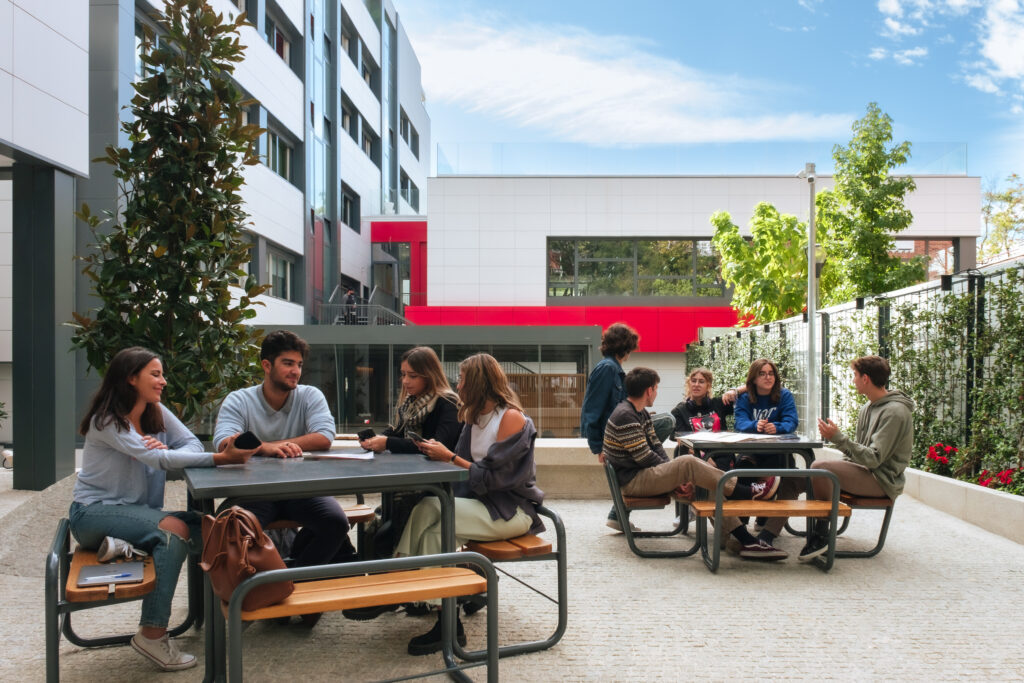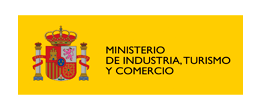
About us
About us
UDIT
Spain’s largest University Campus of Design and Technology
UDIT is the University of Design and Technology of Madrid. We have more than 2,000 students who live their passion for design and technology in the classrooms and facilities in all possible specialisations.
Our students and the University have been nationally and internationally awarded more than 160 prizes, including the National Design Award, presented in 2020 by Their Majesties the Kings of Spain.
This reality involves 3 main concepts:
We are University
With all that this means in terms of rigour, demands, commitment, excellence and research.

We are the only Campus in Spain specialising in this field of knowledge
We devote all our efforts to very specific areas that bring considerable value to society and economic growth. In these areas we are undisputed leaders.

We are the first choice
We are the Campus of choice for hundreds of students who choose us every year as the best option for training in design and technology.
UDIT exists to create and provide transformative experiences for its students, preparing them to succeed in their professional lives in a globally competitive environment. With a unique approach based on educational excellence, rigour, connection with industry, close contact with teachers and intensive use of technology in all its forms, we prepare our students for a constantly changing and evolving professional environment.
We are a University that, despite its young age, has already been recognised as a benchmark in the areas of design and technology. We are defined by our unique, modern, urban campus with excellent facilities.
More than 2,000 students enrol each year in the various programmes covering the three main levels of higher education: CFGS, Degrees and Postgraduates. All our programmes have a global focus and practical application, and are aligned and connected to the industries and changing world of creative professions through constant collaboration with experts, companies and institutions.
In addition to educational excellence, we are interested in applied research focused on sustainability and the collaborative and circular economy.
Mission, Vision and Values
MISSION
To educate future generations of creative professionals committed to promoting social and cultural change through the achievement of their professional goals.
UDIT embraces the task of extending the benefits of a rapidly changing creative, knowledge and innovation economy to society. We are dedicated to building a community of professionals who define, reinvent and drive the national creative economy and position it as an international leader.
We train our students to design their lives according to their passions and interests, finding their place in society by managing to improve their environment and the global community (finding the balance proposed by the Japanese ikigai, a concept that means “the reason for living” and is summarised as the confluence of 4 quadrants: what you love, what you are good at, what you are paid for and what the world needs).
At UDIT we understand that, in order to achieve this in a period of profound technological change, we must connect with industry and business at all levels in order to understand and anticipate changes and trends.

Innovation and the speed of transformation in industries is becoming faster and faster. New professions are created while others are destroyed. And more are transformed and renewed. The old mass production factories are being replaced by production centres connected by new knowledge, technology and creative skills. Students, professionals and institutions need to work together to adapt and succeed. Today, how we learn is as important as where and how we learn.
UDIT will continue to offer programmes and research:
- Employing creativity in all its forms to have the greatest impact on society
- Recognising the full potential of the digital world
- Connecting students, professionals and employers to work together
- Applying learning through real projects
- Learning from leading companies and adapting programmes to the latest trends
- Inspiring students to make a positive impact on their city and the world
- Helping students to start their careers or entrepreneurship
VISION
VALUES

To our society, to others and to our planet.

With our students, our colleagues and our partners.

In all projects and interactions with our partners.

In all its forms and expressions.

In all our operational and training activities.
Internships and employment

UDIT understands the University-Business relationship as essential for the professional success of students. Each academic year is committed to the development of an ecosystem of leading companies and institutions in the sector that collaborate with the centre, creating a close relationship that has an impact on the life of the university community. Companies become a new strategic partner that trusts in and commits to the creativity and talent trained at the University.
UDIT’s training is designed to respond to the real demand of the labour market and to anticipate the profiles and needs that will be required in the coming years.
ACADEMIC STRUCTURE
- Juan Cayón Peña, PhD. Rector.
- Verónica Meléndez, PhD. Director of Relations and International Programs / Director of Institutional Accreditation
- Jose Luis Olazagoitia, PhD. Director of Research
PROGRAM DIRECTORS
- David Alonso Urbano, PhD. Director of the Degree in Game Design and Development
- Maruca García Paredes, Director of the Degrees in Fashion Design and Fashion Management and Communication
- María de los Llanos Domínguez Samper, Deputy Director of the Degree in Fashion Management and Communication
- María José Pérez Luque, PhD. Director of the Degree in Multimedia and Graphic Design
- Juan Carlos Gauli, PhD. Director of the Degree in Audiovisual Design and Illustration
- Rocio Sancho Alambillaga, PhD. Director of the Degree in Interior Design
- Javier Sanz, Director of the Degree in Product Design
- Manuel Sirgo, Director of the Degree in Animation
- Delfina Morán, PhD. Director of the Master’s in User Experience for the Design of Digital Products and Services
- Rocio Sancho Alambillaga, PhD. Director of the Master’s in Interior Design
- David Pérez Medina, Director of the Master’s in Graphic Design
- Frederic Misik, Director of the Master’s in Product Design
- Javier Chavarría, PhD. Director of the Master’s in Illustration
- Rafael García Lozano, Director of the Master’s in Fashion Design
- Javier Morales Escudero, Director of the Technology Department
- Eva Santín, PhD. Director of the UDIT Higher Degree Training Cycles
PROGRAM COORDINATORS
- Susana Redondo, Coordinator of the Degree in Interior Design
- Carlos Vivó, Coordinator of the Degree in Interior Design
- Pablo Ramírez López, Coordinator of the Degree in Interior Design
- Ana Belén Pérez, Coordinator of the Degree in Product Design
- Alberto Tejero Granados, Coordinator of the Degree in Product Design
- Montserrat Pichel, PhD. Coordinator of the Degree in Product Design
- Javier Fernández Alonso, Coordinator of the Degree in Fashion Design
- María Tamames, Coordinator of the Degree in Fashion Design
- Fernando Blázquez, Coordinator of the Degree in Game Design and Development
- Pablo Nogueira, PhD. Coordinator of the Degree in Game Design and Development
- Lara Marín Cerrato, Coordinator of the Degree in Game Design and Development
- Sandra Garrido Romero, Coordinator of the Degree in Game Design and Development
- Carolina García Vázquez, PhD. Coordinator of the Degree in Multimedia and Graphic Design
- Rafael Timón, PhD. Coordinator of the Degree in Multimedia and Graphic Design
- Susana Gómez García, Coordinator of the Degree in Multimedia and Graphic Design
- Sigrid Caballero Martín, Coordinator of the Degree in Animation
- Luis Cerezo, Head of Higher Degree Training Cycles
- Noel Pradana, Coordinator of Higher Degree Training Cycles
UDIT Method

Learning by doing
As action-oriented teaching responds to a holistic didactic approach that involves real student activity in a variety of situations.

Design Thinking
Which is the main methodology used by designers that involves students generating any kind of innovative ideas when creating the image of products or services to best meet the needs of users.

Gamification
Which consists of using a playful activity to involve learners according to the organisation and rules of a game.

Real-life business cases
Where students build their learning through the analysis and discussion of real-life experiences and situations.

Project-based learning
Which involves carrying out a group project of a certain size. The projects have been studied beforehand by the lecturer to ensure that students will develop all the skills they are expected to acquire.

Cooperative learning
Students work in groups to accomplish tasks collectively so that students are supportive and strive for the common good of the group.
Institutions that endorse us


Pearson is the largest Awarding Body authorised by the UK government to develop educational programmes in accordance with DfES (Department for Education and Skills) guidelines.
Pearson is duly constituted under UK law and directly regulated by the UK Government through the Qualifications and Curriculum Authority, QCA.
Pearson is committed to education from early childhood, pre-school and kindergarten through secondary and high school to university and vocational education. Pearson continues to make steady progress and is now present in more than 110 countries.
The BTEC suite of qualifications represents the market-leading group of vocational qualifications. The offer ranges from Basic Courses to Postgraduate Programmes in a wide range of sectors. Due to its modern vision, its flexibility and the impact demonstrated by the employability rate of its students, BTEC qualifications are recognised worldwide.

